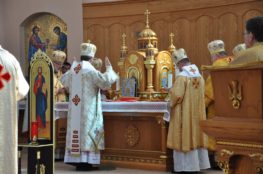The late Fr. Alexander Schmemann’s wry remarks to the New York Times following his return from the Second Vatican Council are well known. Less well known, it seems, are his thoughts on the Council’s Decree on Eastern Catholic Churches (Orientalium Ecclesiarum). The full text of the decree with Fr. Alexander’s response is available online here. For those interested only in Schmemann’s words, I have taken the liberty of quoting them in full below. My brief remarks follow.
It is not easy for an Orthodox to express his views on this particular Decree for the simple yet important reason that the very existence of the “Uniate” Eastern Catholic Churches has always been considered by the Orthodox as one of the major obstacles to any sincere theological confrontation with the Roman Catholic Church.
The Orthodox appreciate, to be sure, the efforts made in these last years by some spiritual leaders of these communities to represent and voice within the Roman Catholic Church the Eastern tradition as a whole, efforts which were especially obvious at the Council itself and which no doubt greatly contributed to the basic orientation of the present Decree. But for the sake of true ecumenical understanding, it must be stressed that for the Orthodox there remains in this whole question of uniatism a deep ambiguity, to which all Orthodox are extremely sensitive and which must have a high priority on the ecumenical agenda of the future.
There can be no doubt as to the positive, irenic, and constructive intentions of the Decree as a whole. It is one more step, and a decisive one, toward the recognition of the Eastern tradition as “equal in dignity” to that of the West. Of utmost importance is its emphasis on the temporary character of its provisions — “until such time as the Catholic Church and the separated Eastern Churches come together into complete unity.” This seems to indicate a rather significant shift in the very understanding of the function of the Eastern Catholic communities called now to serve as bridges to, rather than substitutes for, the Orthodox East.
Certain important reservations must, however, be made. First of all, the Decree seems to “take for granted” and to perpetuate the reduction of the differences between the East and the West to the sole area of rites, discipline, and “way of life.” But it is precisely this reduction which forms the basis of “uniatism” that the Orthodox reject, for they affirm that the liturgical and canonical tradition of the East cannot be isolated from doctrinal principles which it implies and which constitute the real issue between Roman Catholicism and Eastern Orthodoxy.
The decree solemnly proclaims the equality of the Eastern tradition yet, at the same time, formulates and regulates it in terms of a Western and even juridical ecclesiology hardly adequate to its spirit and orientations. To a great degree it remains thus a Latin text about the Eastern tradition. The institution of Patriarchates, for example, is not only given an importance it does not have, in fact, in the Eastern Church, but is also defined as a personal jurisdiction of the Patriarch over other bishops, which is alien to the Eastern canonical tradition, where the Patriarch or any other Primate is always a primus inter pares .
Finally, one word about the communicalio in sacris . In regard to this painful and complex problem, the Decree shows great tact and caution. An Orthodox commentator must stress, however, that even a partial solution of this problem must be a bilateral action and that, given its crucial importance, it must express, on the Orthodox side, the consensus of all Orthodox Churches.
In the five decades since these words were written, two discernible developments have transpired which Fr. Alexander would likely applaud. The first is that “Uniatism” (a vague concept) is no longer the de facto policy of the Roman Catholic Church, though its suspension has left certain Eastern Catholic churches, particularly the Ukrainian Greek Catholic Church (UGCC), in a rather ambiguous position vis-à-vis both Rome and the Slavic Orthodox world. Perceived by the Russian Orthodox as a roadblock to “fruitful dialogue” and “friendly relations” with Rome, the UGCC has sometimes received a chilly reception from the Vatican while, ironically enough, pursuing deeper ties with Ukraine’s two independent Orthodox churches. What Schmemann would think of the present situation is hard to say. Still, it stands to reason that he would applaud the UGCC (and other Eastern Catholic churches) for pushing past the idea that they are “ritual bodies” only without any substantive connection to the Christian East’s full intellectual-spiritual heritage.
This leads to the second development Schmemann would appreciate, namely an increased awareness among Western Christians that the Christian East is much more than a collection of “exotic” art and liturgical forms. The liturgy, while central to the lives of the Byzantine Catholic and Orthodox communions, cannot be cut loose from the East’s authentic ecclesiological and theological patrimony. The vexing question that remains is whether that patrimony can breathe deeply in an environment dominated by Roman Catholicism. Have the Eastern Catholic churches, such as the UGCC and Melkites, found a way to do so that is without compromises or, absent those, paradoxes? Or are the Orthodox still correct to believe that very real, and extremely difficult, disagreements remain between East and West that cannot be resolved by a simple formula of submission to the Roman Pontiff? But what “submission” means in today’s fraught ecclesiastical environment appears to be an open question, not just for the Orthodox, but many Catholics as well.



